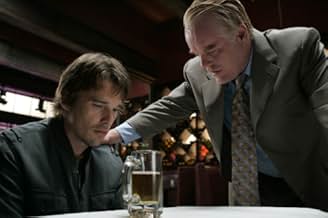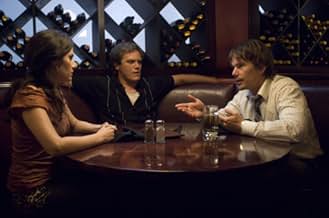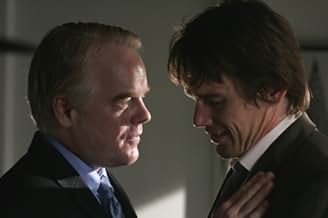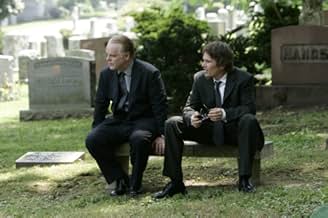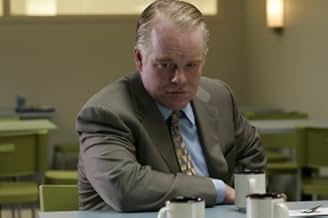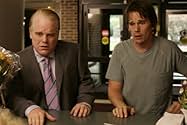Deux frères organisent le vol du magasin de bijoux de leurs parents qui se passe affreusement mal et déclenche une série d'événements qui va les mener avec leur père et la femme d'un des frè... Tout lireDeux frères organisent le vol du magasin de bijoux de leurs parents qui se passe affreusement mal et déclenche une série d'événements qui va les mener avec leur père et la femme d'un des frères vers un dénouement bouleversant.Deux frères organisent le vol du magasin de bijoux de leurs parents qui se passe affreusement mal et déclenche une série d'événements qui va les mener avec leur père et la femme d'un des frères vers un dénouement bouleversant.
- Réalisation
- Scénario
- Casting principal
- Récompenses
- 17 victoires et 28 nominations au total
Avis à la une
To solve all their problems, he persuades his brothera likable loserto join him in a plan to steal their own parent's small store Their parents are happily married and proprietors of a jewelry store situated in New York's Westchester County Sixty thousand dollars is all they'll need to get their life out of desperation
Three main characters are important in this movie
First the two brothers Each of them is a complex individual, threatened with multiple motivations, and sunk into doubts and disappointments The two are desperate characters, financially and emotionally
Andy is selfish He feels that he has never had the love of his father He is the corrupting influence, turning his brother into an assailant, and his beautiful woman into an adulteress
Hank is a puppet too weak to resist his brother's wishes His ex-wife is one of the reasons he needs money as he owes her hundreds in child support . He longs to regain the confidence he once had with his father
The third character is their weary and deplorable father Charles Hanson (Albert Finney), especially in the haunting climactic scenes
Telling you more about the details could lessen the impact of the film, and therefore the entertainment...
Tomei's performance conveys great depth and emotion even with her look, her touch, her particular move
Lumet's direction is firm, fresh and brutal.
Two brothers with pressing financial problems conspire to rob a suburban jewelry store owned by their elderly parents. The only victim is going to be the insurance company. The robbery goes awry and two people die. Most of the film is concerned with the aftermath. The action is non-linear and seen from the main character's differing points of view, but it is not difficult to follow. What is not so easy to work out is the back story how did the brothers get into such a mess? There are clues the younger brother being the baby of the family is his fathers' favorite while the older brother seems to be carrying a lot of baggage about his relationship with his father, and vice versa, but that hardly accounts for him becoming a heroin-using murdering embezzler.
As the scheming older brother, a corpulent Philip Seymour Hoffman dominates the film, but he is well supported by Ethan Hawke as his bullied, inadequate younger brother. Albert Finney as their father seems to be in a constant state of rage but then the script calls for that. Marisa Tomei as the older brother's cheating wife at the age of 42 puts in the sexiest performance I've seen in many a year. The film literally starts with a bang, but we are out of that comfort zone pretty quickly.
I don't know the origins of this story by first time scriptwriter Kelly Masterton but I suspect that like Lumet's great 70's film "Dog Day Afternoon" it is based on fact it's too silly to be untrue. Lumet is just about the last of those immensely versatile old-time craftsman studio directors who with immense speed were able to direct just about anything that was put in front of them. Some great films were produced that way as well as some classic turkeys. This isn't a classic of either sort it's a well-crafted piece of downbeat entertainment. It will probably leave you feeling that you were lucky not be a member of a family as dysfunctional as this one, but still wondering as to how they got that way. We do know the parents were happy but we see so little of the mother and hear so little about her it is impossible pick up on her relationship with the boys. (There is also a daughter whose presence seems redundant). Well, like Tolstoy, we have to conclude that "each unhappy family is unhappy in its own way".
It's one of those films whose plots are so thick, that one is very reluctant to go into details. It is a movie that is best enjoyed if entered without any prior knowledge to the events about to unfold, as there are twists and turns. But the thick and richly wrought plot is not at all at the center of this film; the true focus is, as I mentioned, the morality tale; the motives that drive these two men to the actions they do in the film. In a plot structured like a combination between the filmographies of both The Coen Brothers (namely Blood Simple and Fargo) and Quentin Tarantino, we see two men driven under various shady circumstances to pull off a fairly simple crime that goes incredibly, ridiculously wrong, and reciprocates with full force and inevitable tragedy. And to make it all the more interesting, the film is told in a fragmented chronology that keeps back tracking and showing a series of events following a different character every time and always ending up where it left off the last time. Sizzling, sharp, thick and precariously depressing, Kelly Masterson's screenplay is surprisingly poignant and well rounded, in particular because it is a debut screenplay.
But the film has much more going for it than just it's delectably sinister and quite depressing plot. First and foremost, the picture looks and feels outstandingly well. Sidney Lumet has, throughout his career, consistently employed an interesting style of cinematography and lighting: naturalistic and yet stylish at the same time. The film carries with it a distinctive air of style and class, with wonderful natural lighting that just looks really great. Editing is top-notch; combining the sizzling drama-thriller aspect with great long takes that really take their time to portray the action accordingly. And vivid, dynamic camera angles and movements further add to the style. The film is also backed by a fantastically succulent musical score by Carter Burwell.
The screenplay does its part, and of course Lumet does his part, but at the film's dramatic center are three masterful actors who deliver incredibly good performances. First and foremost, there are the two leads. Leading the pack is Philip Seymour Hoffman, who has always been an excellent actor but has stumbled upon newfound leading-man status after his unnaturally fantastic Oscar-winning performance in Capote. His turn in this film is fascinating: severely flawed, broken, manic. Hoffman has some truly intense scenes in the film that really allow his full dramatic fury to come out, and not just his subtlety and wit. At his side is Ethan Hawke, who has delivered some fantastic performances in many films that are almost always overshadowed by greater, grander actors. Here, he bounces off Hoffman and complements him so incredibly well; in all, the dynamic acting between the two of them is just so utterly fantastic and convincing, the audience very quickly loses itself in the characters and forgets that it's watching actors. And then there's Albert Finney. Such a supple, opulent supporting role like the one he has requires a veteran professional and here Finney delivers his finest performance in many years as the tragically obsessed father to the two brothers who get caught up in the crime. I love how the dynamics between the three of them play out. I love how Hoffman is clearly the dominant brother and shamelessly picks on his younger brother even now that they're middle-aged men; and yet despite this, it is clear how Finney's father favours Hawke's younger, weaker brother. Also on the topic of the cast, the two supporting female characters wives of the brothers also feature fantastic performances from Amy Ryan and Marisa Tomei, whose looks just get better and better as the years go by.
This film isn't revolutionary. These themes and this style have already been explored by the likes of The Coen Brothers, and it's very easy to imagine them directing this film. But for a film that treads familiar ground, it simply excels. Lumet employs his own immense directorial talent and employs his unique and very subtle sense of irony and style to Masterson's brilliantly vivid, intense, and morbidly depressing first-time screenplay. The lead performances are incredibly intense and the film features absolutely fantastic turns from Hoffman, Hawke and Finney; but the truly greatest wonder of the film is that three years after he won a Lifetime Achievement Oscar, much revered as the ultimate sign of retirement in the film business, Sidney Lumet proves that he still has the immense talent to deliver a truly wonderful, resonant, intense piece of cinema reminiscent of his golden years.
Naturally, things don't go their way and both of them find themselves stuck in an ever deceasing spiral as more and more things get out of control. I won't go into the actual plot in too much detail, as anything I say will probably spoilt the film of you. However, what is nice is that you can see things from their points of view. Both men have problems. Yes, there may be easier (legal?!) ways of getting cash, but both have already gone too far to be able to turn around and utilise legitimate money-making means. Then, when things start to go wrong, everything happens logically. You'll feel for the two men (even if you don't always like them). Albert Finney is on the cast list and he does a good job, too. Although his part is decidedly smaller than his two on-screen sons, but what he does he does well.
'Before the Devil Knows You're Dead' is a slow film. Maybe when I watched it before I was expecting some sort of 'action-orientated' gangster film where people are shooting each other and delivering a witty quip here and there. It's nothing like that. If you're looking for that sort of experience, look somewhere else. This film is quieter, subtle and sadder in tone. It's also nearly two hours long, but, despite being slow, that's not a bad thing.
If you're in the mood for 'thoughtful' over 'thrilling' give this one a go. I'm definitely going to watch it again – probably in a few years, but definitely.
This is gritty cinema, marked by focused direction, intriguing writing, non-linear storytelling, great pacing in editing, and a very tough emotional tone.
Unsurprisingly, Philip Seymour Hoffman completely outshines a relatively strong cast, including a mediocre Marisa Tomei, a strong performance by both Ethan Hawke, an even outshines Albert Finney who delivers a brilliant performance. He simply steals the show and once again is truly Oscar-worthy. How can one be surprised; in my book, Seymour Hoffman is among, if not the single greatest actor of his generation - and yes, I'm considering him up against masters such as DiCaprio, Pitt, Phoenix, Bale, Gyllenhaal, Blanchett, Colman, Adams, Davis, and Swinton.
Highly recommended and a great swan song from Lumet!
Le saviez-vous
- AnecdotesSidney Lumet said that the scene between Philip Seymour Hoffman and Marisa Tomei in the car when Hoffman has his breakdown was one of the most extraordinary scenes of acting with which he had ever been involved.
- GaffesIn the scene where Andy and Gina are discussing whether they should leave for Rio, she mentions that there are no extradition treaties between Brazil and the United States. This is not true, although her comment was actually more a jab at her husband than actual knowledge.
- Citations
Andrew 'Andy' Hanson: The thing about real estate accounting is that you can, you can, add down the page or across the page and everything works out. Everyday, everything adds up. The, the total is always the sum of its parts. It's, uh, clean. It's clear. Neat, absolute. But my life, it, uh, it doesn't add up. It, uh... Nothing connects to anything else. It's, uh... I'm not, I'm not the sum of my parts. All my parts don't add up to one... to one me, I guess.
Justin: Get a shrink or a wife.
Andrew 'Andy' Hanson: Uh, I got a wife.
Justin: Get a shrink.
Meilleurs choix
- How long is Before the Devil Knows You're Dead?Alimenté par Alexa
Détails
- Date de sortie
- Pays d’origine
- Langue
- Aussi connu sous le nom de
- Antes que el diablo sepa que has muerto
- Lieux de tournage
- Sociétés de production
- Voir plus de crédits d'entreprise sur IMDbPro
Box-office
- Budget
- 18 000 000 $US (estimé)
- Montant brut aux États-Unis et au Canada
- 7 084 227 $US
- Week-end de sortie aux États-Unis et au Canada
- 73 837 $US
- 28 oct. 2007
- Montant brut mondial
- 25 038 466 $US
- Durée1 heure 57 minutes
- Couleur
- Mixage
- Rapport de forme
- 1.85 : 1
Contribuer à cette page







